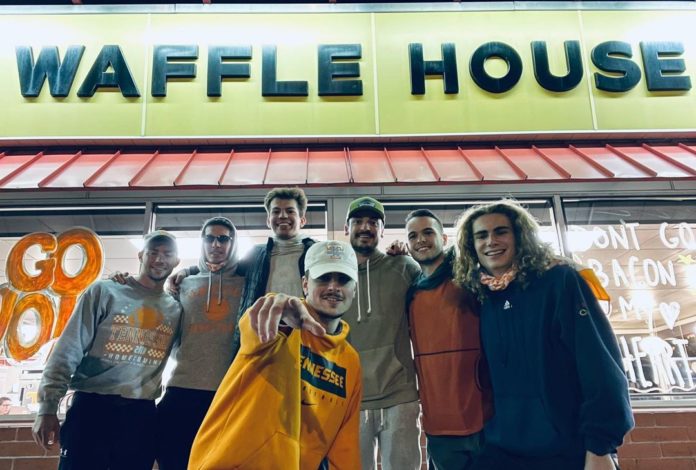Due to the COVID-19 pandemic, Greek life has been different across the country this semester. This is especially true for students at the University of Tennessee who resumed in-person classes this fall. The importance of strong leadership in a crisis has been underscored at national and local levels, in terms of providing information and enforcing safe behaviors. School organizations are no exception, but there, leaders are often inexperienced and face particular challenges.
“When COVID happened, we didn’t have a COVID chair. There’s no pandemic officer, said Andrew Granger, President of Beta Upsilon Chi, an Interfraternity Council (IFC) fraternity at UT. “So it [COVID-19] just very quickly and abruptly flips everything on its head. And so I end up having to be in a lot more hands-on role in certain aspects.” Organizations’ executive members had to find new ways to keep members safe.
Leesa Gavin, president of Alpha Delta Pi, a NPC sorority at UT, said “Every Thursday I would send out a note that was kind of like ‘Leesa’s do’s and don’ts on campus.’ And it just kind of described all the necessary policies that they needed to follow in order to keep not only our organization successful, but also that individual successful,” said Gavin.
IFC President Allen Pack III created a COVID-19 proclamation that every fraternity president had to sign. “This proclamation states that every chapter president will make good faith efforts towards following COVID-19 guidelines,” he said.
Expulsion is a consequence for students who do not take protocols seriously or who disobey the student code of conduct. “I was more fearful of someone ignoring my messages and still acting that way and then getting expelled, which is actually a new pressure I’ve never experienced before, fearing my peers and my members getting expelled,” Gavin said.
“I was more fearful of someone ignoring my messages and still acting that way and then getting expelled,” Gavin said.
Students began to come back to campus starting the end of July to the middle of August. There was a spike in case numbers in Knox County during those weeks. Case numbers increased by 41.2% (1,526) from July 31st to August 17th according to the city’s data.
A large contributor to the number of cases increasing has been the social gatherings off campus. Returning students almost immediately started gathering with friends they hadn’t seen in five months.
The new social experience
One of the main roles of Greek life is socialization. Before COVID-19 most organizations would have multiple social events per month, focusing on relationships within the organization, or mixing with other groups .
“We’ve only had one sisterhood event this semester…we had a picnic at the park event, where people brought their own food and sat around World’s Fair Park…masks were worn when they weren’t eating,” said Emily Bryant, president of Delta Gamma a National Panhellenic Council (NPC) sorority at UT.
Other organizations, like Beta Upsilon Chi (an IFC fraternity at UT) are experiencing similar issues. “The reality is we’re a social fraternity on a college campus. Anybody in Greek life, they want to be part of an experience and part of a community, and that community should continue…a group experience and so still trying to uphold that and make it a really valuable experience for all of our guys. And obviously, we cut dues significantly, but just finding ways to keep people connected,” Granger said.
One of the biggest challenges is the new process for planning events. “Just to do a single event takes about four times as much work as it used to, and that’s if you get everything approved. Everything we do has to go through UT, which has been very challenging to get things approved. They’ve [UT] been great working with us, trying to find ways to do it.” Granger said.
Hosting events during a pandemic
However hosting events during a pandemic is still not impossible. “We were able to put on a drive in movie night, which kept everyone socially distant and safe. And it was something really fun. I think we raised over ten thousand dollars [for the Ronald McDonald House and the ADPi Foundation.] Another thing we did was we started takeout Tuesdays, which encouraged members to get their meals to go, and take them to a park, socially distance with friends and eat their dinner,” Gavin said.
On the other hand, some organizations have decided not to hold events all together. “We have held off on holding any kind of social events. Nothing has been sponsored by us. I don’t want to be responsible for some major outbreak on campus,” said Harrison Eller, President of Sigma Chi, an IFC fraternity at UT.
Mental Health
Granger explained that students’ mental health has been a major concern. “The thing about COVID that I think is far too often overlooked is the mental health effects, emotional health, and spiritual health…what are ways that we can physically safe from the virus, but we can still start to connect more in ways so people can be healthy all the way mentally, emotionally, spiritually, physically,” he said.
While these student organizations have experienced some permanent changes, members and leaders hope for change to regulations in the upcoming semesters. “This semester was just a learning experience hopefully, and next semester will be better because of it,” Eller said.





















